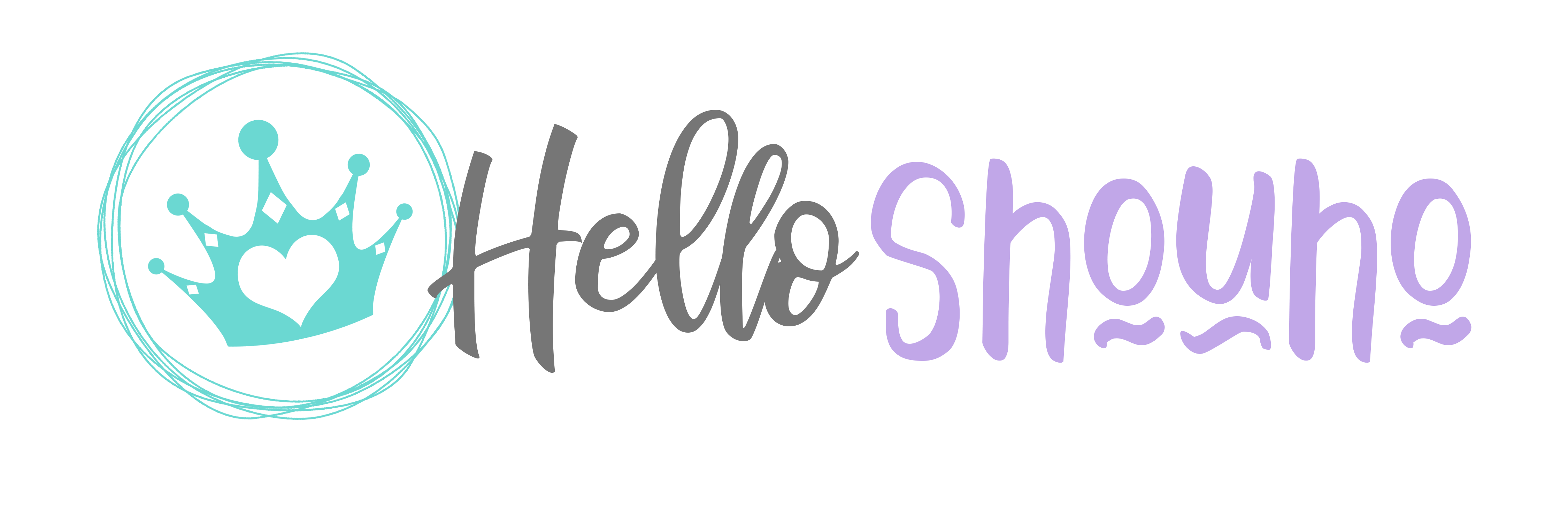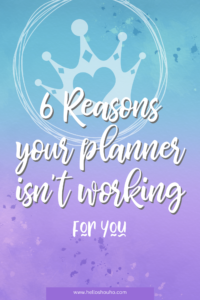6 Reasons your Planner isn’t Working
Sometimes we think we aren’t planner people – it’s not for me. I don’t have the habit built; it’s a waste of paper or I can’t carry it. A lot of these things can be true for you if you haven’t found best type of planning for you. I still think it’s worth trying to build the habit, so let’s work in reverse, have you caught yourself in any of these traps?
TLDR:
- Use what works best for you – digital, paper? both? It might be both if you aren’t using either consistently alone.
- Not making time to plan. Spending time either in the morning or evening (or both) with yourself to plan the next day will help you be more organized. My tip – when it doubt, write it down and snap a picture of it.
- Sometimes we have trouble figuring out where to start or getting started. Pick a task, set a timer, work for 20 minutes. You don’t know what you don’t know, and you can always change directions.
- Know yourself, so you can know what is reasonable of a challenge. There are many planning methods to help measure growth, try a few out. Many of us are time blind when it comes to how long task will take us. You only get better by writing it down.
- Use your planner for you, to plan. If you are having trouble with perfectionism, purposely make a a few mistakes to take the pressure off. It doesn’t have to be pretty to be functional.
1. I want to go digital but I never update it.
If you are wanting to go digital but find yourself not using it, might reconsider. Digital is a nice planning method. I understand the benefits of digital: better for the environment, convenient as it’s everywhere, all the hype with cute or fun designs. Yet when it comes to planning you need to do what feels good to your brain. It might be paper. It might be a combination. It might be a task list.
So many of us see these pretty Notion dashboards and IPad planners and want to get into it. I get it too, I love seeing the dashboards and its inspiring. I know that for me, if I am going to remember it or get it done – I have to write it down. Some things can be digital for me. I tend to take pictures of my weekly or a shopping list as needed. For me, writing it down the short term, is the best way for me to remember things.
Resource: What is Notion?
2. I want to use a paper planner but it’s annoying to carry everywhere.
On the paper side, if you do not enjoy carrying a planner around, it may be time to do a hybrid system. Something you can do is to plan your month or week out in paper at the start, then snap a picture to carry for you make sure it gets done. This is great for monthly planning. You can also add digital appointments after to Google so it reminds you.
Don’t feel bad about need it, if it helps you manage your day to day, take it and plan it. The best system is the one that gets used.
Many of us buy a planner in the store to start with and then we either lose it, forget about it and never come back to it. It’s so enticing when you see it and you think – this is it – I’m going to get it together. Cute covers get us all.
3. I forget to plan things and end up adding them later.
If you can carve out time at the end of day or the beginning you will feel better prepared for the day ahead. Items will be off your mind as a task and you can zero in and focus on the first thing if the rest are not in the back of your head. This is the reason brain dumps work so well to clear our heads.
This can be a great way to wind down from the day and clear your head from work. Write the things down you don’t want to forget, empty your head of to-dos for tomorrow, then plan out what you can get done. Making planning a consistent habit, morning, night, or both, will help you get those items out of your head and into task list. You do have to have a place to keep them.
Again, my note method works as a dump on paper, then I snap a picture in case I loose it. ‘Cause ADHD.
“I have so much going I don’t have time to plan.” This is argument is counter intuitive, as planning will only help you. It can feel like this time is better spent on action, but 10 minutes of planning will save you hours of work.
4. I only focus on what isn’t helpful.
You might benefit from a bullet journal instead of a regular planner, or even just a notebook to carry around. Digital or Paper both works well if you are a task master when it comes to your daily list. With a journal you can make to-do list, as well as notes or spreads. You can write ideas down to your hearts content. This is great at getting it out of your head. There is nothing wrong with writing that idea down now, mapping it completely out, to get it out of your head. You can come back later.
You also need to be able to figure out the things you need to be doing in this method. Sometimes it is going to be the wrong thing. It just is, but remember finished is better than perfect, so start where you are with your idea. You can always change directions.
This is part is more on focusing, than planning.
The hard part here can be getting started on the things that matter. If you tend to work in spurts like this, it’s hard to motivate yourself outside of them. This is how I like to work personally.
I work in focused spurts, when I am motivated to do X, I will do X for hours if left alone. If I cannot think of anything but X and I need to do other work, or adulting things – I set timers. I can do X for an hour, then I have to do an hour of something else. Sometimes this bleeds over to I find a completion point, but it works well for me. Again, ’cause ADHD. I highly recommend this for when you are lacking in motivation for something else. Sometimes starting the thing you don’t want to do for 10 minutes will get you in a flow state and you can keep going. Other times, whatever, you did 10 minutes of it.
5. Your plans aren’t realistic
If you over extend your day, you will feel like a failure constantly. A good way to get over this is to time out how long a task takes you. For example, writing takes an hour. Editing – another hour. That’s two hours I need to be focused for an article. If I shove that in one day when I am already busy with other things, I might feel like a failure because I didn’t get that task down.
Knowing how you work, what you can accomplish in a time period, will help you plan more realistic. Another thing I like for goals is a ‘good, better, best’ approach. So Good would be success, at the lowest end. Best would be the most amazing outcome. Better is somewhere in the middle. This allows for more of a range on some goals. Particularly smart ones.
Another method is OKRs – or “Objectives and Key Results.” This method sets a more fluffy goal (improve moral) and then you pick a indicator, such as survey results. The indicator is a hard line and you work over a quarter to achieve this. If miss the target, OKRs suggest you lower the goal. Maybe your indicator was a 10, but that was not achievable, but you got an 8. So next quarter, you want to maintain that 8 so you do similar subtask and at the end of the quarter you still have an 8. Stay with me here, then next quarter, you aim for a 9 and work even harder because you achieved the 8 so easily. There is more to it, Google OKRs, but essentially you change the level of difficulty based on results. You find the right level of challenge so you can keep growing at a reasonable pace.
Resource: an OKR explanation, off site
6. You think it needs to be picture ready, or perfect.
If you are planning to show it on Instagram to be a planner influencer, sure. If it works for you. If it this doesn’t work for you more people will be interested in what actually works for you. Especially if you are getting things done.
Sometimes we forget planning is for us first. And I get it if you are working on growing a Instagram following. Just remember the reasons you started planning and if that is what you want. You may end of with two planners – a pretty one and a more basic work one.
Another easy thing to do if you are worried about mistakes, is to make one. On purpose. This gets it out of the way in the beginning. Many mistakes are just a whiteout away of fixing anyway, but making that first one always takes a little pressure off.
That was a lot. I am going to start putting TLDR’s at the top of these. The key takeaways are plan for you, use what works for you without guilt, and just get started. The just get started feels like the hardest advice, no one likes to hear that. But it’s true. Start with one thing and go from there.
Have a happy week~

